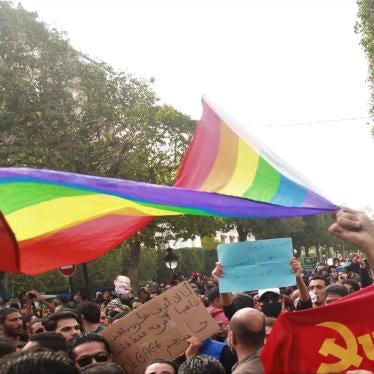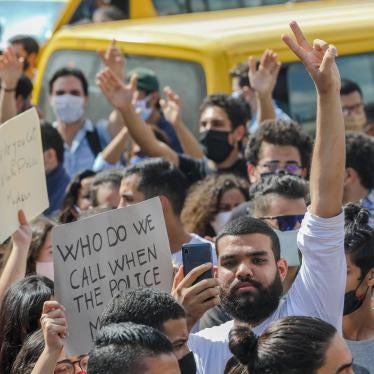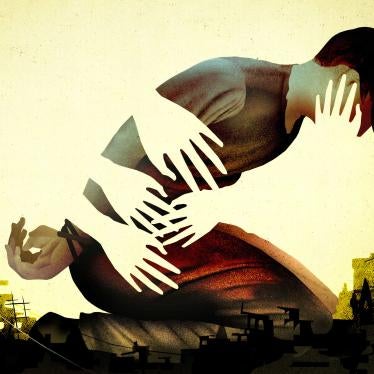February 23, 2021
Clement Nyaletsossi Voule
Special Rapporteur on the rights to freedom of peaceful assembly and of association
Irene Khan
Special Rapporteur for freedom of opinion and expression
Joseph Cannataci
Special Rapporteur on the right to privacy
Mary Lawlor
Special Rapporteur on the situation of human rights defenders
Victor Madrigal-Borloz
Independent expert on protection against violence and discrimination based on sexual orientation and gender identity
Representatives of EU Member States
Re: Violations Targeting Human Rights Defenders, Including SOGI Activists, in Tunisia
We write to you on behalf of Human Rights Watch and Damj Association for Justice and Equality, a Tunis-based LGBT rights group, to raise concern regarding the violations committed by Tunisian security forces against activists at protests, including targeting activists working on issues related to sexual orientation and gender identity (SOGI), in violation of Tunisia’s constitution and international human rights protections.
Human Rights Watch documented cases where police arbitrarily arrested activists at protests, including instances where they rounded them up on the street, physically assaulted them, threatened to rape and kill them, and refused persons in custody access to prompt legal counsel. Activists also said individuals harassed them on social media and threatened them with violence based on their gender non-conformity and presumed sexual orientation. These recent accounts were provided against the backdrop of increased persecution of LGBT people during the Covid-19 pandemic and an intensified crackdown on LGBT organizing in recent years.
Since the protests began in mid-January, which have been largely peaceful by day, Tunisian organizations have identified over 1,600 people arrested, around 30 percent of whom are minors, by authorities at protests to date. Civil society also reported unsanitary conditions and overcrowding in detention centers where protesters were being held, in violation of the government’s own hygiene and social distancing regulations to combat the spread of Covid-19, as well as global guidelines. Children were also detained alongside adults, and many remain detained and have been subjected to physical violence by prison authorities.
According to activists who spoke to Human Rights Watch, the crackdown against them intensified due to their participation in protests, when individuals posted their pictures on social media began threatening to arrest protesters. Individuals publicly harassed activists and published their private information without their consent, in some cases “outing” LGBT activists. They also smeared them based on their sexual orientation or gender identity in an attempt to discredit the broader protest movement, and posted their pictures online with messages inciting violence against them.
As a result of being “outed,” individuals reported having to leave their homes and neighborhoods and deleting their social media accounts. One activist said he fled the country after police arbitrarily detained and beat him, and his name and address were posted online.
According to a statement released on February 5, Prime Minister Hichem Mechichi met with security forces and commended their “professionalism in dealing with protests,” and warned against protesters’ attempts to “lure security forces into using violence against them.”
These reported abuses at protests follow an intensified crackdown on LGBT organizing in recent years. Members of Damj Association, including its director, Badr Baabou, and social worker, Saif Ayadi, reported that on several occasions, in 2018, 2019, and 2020, their places of residence, as well as Damj’s offices, had been forcibly entered during their absence, and intruders had tampered with work files and devices. Both Baabou and Ayadi had received direct threats from police, whom they suspect of conducting the break-ins.
Other staff members of Damj told Human Rights Watch that they are frequently subjected to police harassment and intimidation, including physical and verbal abuse by police, and questioning about the organization’s activities near Damj’s offices and on the street.
Human Rights Watch and Damj have also documented increased abuses against LGBT people during the Covid-19 pandemic. In December 2020, Tunisian police arrested LGBT activists during a peaceful demonstration in front of the Tunisian parliament. In October, Tunisian police attacked and arrested demonstrators, including LGBT activists, who were peacefully protesting a draft law that would limit criminal accountability for the use of excessive force by the security forces. Activists were accused of “protesting without a permit,” and “violating the state of emergency law,” and “assaulting police officers,” which they denied. In August, police officers guarding the French Embassy in Tunis physically and verbally assaulted transgender activists and incited bystanders to attack them.
Authorities have continued to prosecute and imprison presumed gay men under article 230 of the penal code, which provides up to three years in prison for “sodomy.” In June 2020, the Kef First Instance Tribunal sentenced two men charged with sodomy under article 230 of the penal code, which provides up to three years imprisonment, to two years, reduced to one year on appeal. The men had refused police’s demands to subject them to an anal exam, an invasive and discredited practice that can amount to torture and that Tunisian authorities routinely use to “prove” homosexual conduct, despite formally accepting a recommendation at the UN Human Rights Council in 2017 to end the use of forced anal exams.
In 2020, Damj Association provided legal assistance to LGBT people at police stations in 116 cases and responded to 185 requests for legal consultations. Damj said these figures are five times higher than those they recorded in 2019, suggesting an increase in the persecution of LGBT people during the Covid-19 pandemic.
Tunisia’s continued crackdown against activists and LGBT people violates their basic rights, including their right to privacy, bodily integrity, free movement, free expression, assembly, and association, including on the internet, as well as their right to nondiscrimination and protection under the law. The abuses violate Tunisia’s constitution and international treaties to which Tunisia is a party. The constitution allows for a lawyer to be present during police interrogations, and prohibits “mental and physical torture.” The African Commission on Human and People’s Rights explicitly calls on member states, including Tunisia, to protect sexual and gender minorities in accordance with the African Charter.
We are particularly concerned to see such back-tracking in a country that has witnessed progress toward recognizing the rights of LGBT people. In 2018, the Commission on Individual Freedoms and Equality, appointed by President Beji Caid Essebsi, proposed, among other actions, to decriminalize homosexuality and to end anal testing in criminal investigations into homosexuality. Members of the Tunisian Parliament also introduced draft legislation for a code on individual freedoms, which incorporated several proposals from the presidential commission including abolition of article 230. In 2019, Tunisia was the only country in the Middle East and North Africa (MENA) region that voted at the UN Human Rights Council in favor of renewing the mandate of the independent expert on protection against violence and discrimination based on sexual orientation and gender identity.
Human Rights Watch and Damj Association urge the Special Procedures mandate holders and government representatives of EU member states to engage with the Tunisian government to hold their security forces accountable for violations of international law, and ensure that authorities refrain from using “sodomy” laws and vague “morality” claims, to curtail basic freedoms of sexual and gender minorities, and undermine the rights to free assembly, association, and expression for all. We also urge you to ensure that groups can organize in support of SOGI rights without interference and intimidation by authorities.
Tunisia is one of the few remaining countries in the MENA region that provides a space for organizing around SOGI issues, and human rights more generally, and we regret to watch this space shrink. We believe it is necessary for the international community to urge Tunisia to adhere to its international human rights obligations.
Thank you for your continued support. Please feel free to contact us should you require any additional information regarding any of the issues we have raised.
Respectfully,
Graeme Reid
Director, LGBT Rights Program
Human Rights Watch
Eric Goldstein
Acting Director, Middle East and North Africa Division
Human Rights Watch
Badr Baabou
Director
Damj Association








